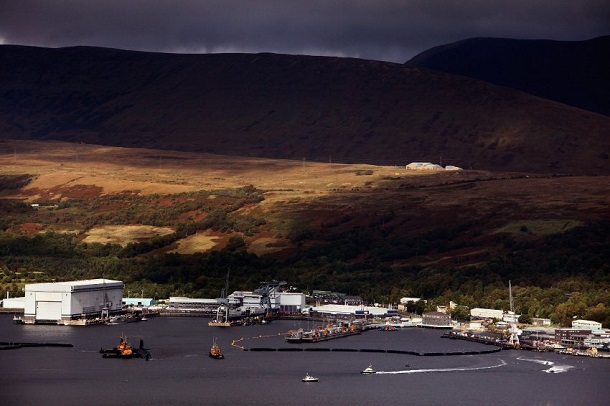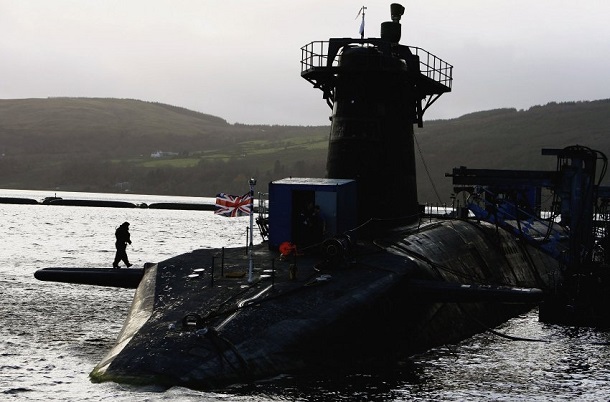Scotland will decide in two weeks on independence – and the British nuclear weapons. A “Yes” to the submarine fleet will be banned. An alternative location does not exist.
Jimmy Watson has tried everything: He has blocked roads. He climbed on trucks with rocket. He has overcome barbed wire fences and slipped on the deck of a nuclear submarine. It has nothing brought: The operation on the Navy Base Faslane, the home port of the British nuclear submarines, just kept running.
Now the 32-year-old peace activist senses a unique opportunity: If the Scots vote in their referendum on 18 September for independence, Scotland would be free of nuclear weapons within five years. The at least promises the Scottish Government. Britain would have to find for its nuclear fleet with alternative locations in England – or abolish weapons of mass destruction altogether.
A yes to independence, Jimmy says with satisfaction, would be “an opportunity for real change.” And currently fetch the advocates of secession on rapidly – it looks like an extremely tight result.
Jimmy lives in Faslane Peace Camp, a place with about a dozen caravans on the access road to the U-boat harbor. In the trees hang banners (“Free Scotland of nuclear weapons”), the rusting trailers are painted with peace signs in bright colors. The protest camp has existed for over 30 years, but within reach the big goal is only now moved thanks to the Scottish Nationalists.
From 160 “Trident” missiles with nuclear warheads, there is the British nuclear arsenal, the country relies exclusively on sea-based systems. You can be fired from four nuclear-powered submarines. At least an operational submarine is constantly at sea, the rest is in the hole Gare, an hour north of Glasgow. The missiles and nuclear warheads are deposited separately in a few kilometers away Coulport.
Scottish Independence: Moving to England would cost billions

For the government in London exile their submarines from Scotland would be a nightmare, because it has no alternative location. In the initial search in the sixties had several ports in England and Wales rejected because they were not deep enough or were in densely populated areas. Today, the situation would be even more difficult.
According to a study of the military think tank Rusi would turn into most of the southern English port of Plymouth as a new home for the nuclear submarines on. Here already is the conventional submarine fleet of the Royal Navy, investors and docks were therefore available. A new warehouse for the nuclear missiles could be built in Falmouth, suggest the experts.
The move would be feasible according to the authors, but problematic. The cost would be 3.5 billion pounds will slow down as feared. But in the sailing paradise Falmouth was considerable resistance of the people to expect against the nuclear warheads.
Theoretically, the British government could also enter into a license agreement with Scotland and Faslane continue to operate against payment. But first, it is doubtful whether the Scottish Government would be ready. And secondly, the UK would probably hesitate to suspend its nuclear program to the changing whims of a foreign government.
Therefore the Rusi-authors consider it possible that the British government could end refrain entirely from nuclear weapons. Even the former NATO Secretary General George Robertson, a Scot, has already warned against the off the British nuclear power. Scottish independence could have “cataclysmic” consequences for NATO, he said in Washington
Scottish Independence: Residents of Helensburgh fear for jobs
The headquarters of the independence campaign in Helensburgh such geostrategic considerations play no role. Filmmakers and nuclear weapons opponent Brendan O’Hara looks especially the horrendous costs: hundreds of billions of pounds will cost the renewal of the Trident program, from 2016 to four new nuclear submarines are built. The idea of nuclear deterrence is outdated, says the 51-year-old. The money could be invested better.
However, criticism of Trident do not want to hear many of his fellow citizens. The 20,000 inhabitants of the small town are accustomed to the sight of the U-boats on the Clyde. Every few weeks immersed one of the monsters in front of their waterfront on, is towed by tugs in the harbor or open sea conditions vanishes. The view that here soon only could cross sailboats, calls for most alarm more than relief forth. They fear for thousands of jobs.
“My son works on the Navy base,” says the retiree Janet Fortune. “He would have to move if Scotland would become independent.” Others worry about housing prices, when the largest employer leaves the area. It is very difficult to convince Helen Burgher of independence, says Margaret Pollock, leader of the local “Yes” campaign.
The activists in the coming weeks, but continues swarm, with their blue and white “Yes” button on the chest. The concern about jobs is unfounded, says O’Hara. He refers to the plan of the Scottish Government to relocate the headquarters of the Scottish forces to Faslane. Even after withdrawal of nuclear weapons could exploit its tourist potential Helensburgh. “Maybe we get finally a beach.”
[adrotate group=”14″]
 The Royal Mile is becoming increasingly dangerous
The Royal Mile is becoming increasingly dangerous Netanyahu’s Residence Targeted in Another Attack
Netanyahu’s Residence Targeted in Another Attack Russia Halts Gas Supplies to Austria, Marking a Shift in European Energy Relations
Russia Halts Gas Supplies to Austria, Marking a Shift in European Energy Relations Scholz speaks to Putin on the phone for the first time in two years
Scholz speaks to Putin on the phone for the first time in two years